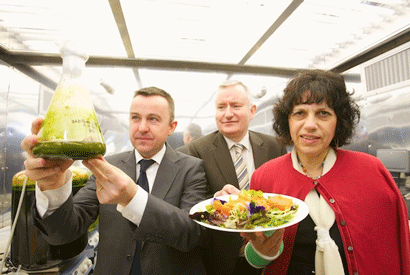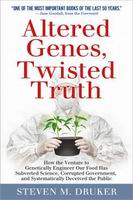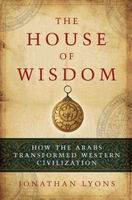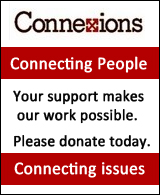Other Voices: The Connexions Newsletter
April 23, 2016
This Issue: Science and its enemies
Our society and its institutions, public and private, regularly tell us that science, and education in the sciences, are crucial to our future. These public declarations are strangely reminiscent of the equally sincere lip service they pay to the ideals of democracy. And, in the same way that governments and private corporations devote considerable efforts to undermining the reality of democracy, so too they are frequently found trying to block and subvert science when the evidence it produces runs counter to their interests. Real live scientists doing real live science, it seems, are not nearly as loveable as Science in the abstract.
The trouble with science, when carried out conscientiously in accordance with the principles of rational inquiry, is that it may produce evidence and conclusions that run counter to the interests of the powerful and the rich. The science of global warming is a huge threat to the immensely profitable fossil fuel industry. Exxon knew, decades ago, that carbon emissions are linked to climate change – and acted to suppress and lie about the science, using the same techniques that had been used for many years by the tobacco industry to deny that smoking is linked to lung cancer.
In the same way, scientists who have shown that fracking produces earthquakes and poisons water are now under constant attack by the industry. Universities, ever more dependent on corporate funding, are told that they won’t receive money if they employ scientists who engage is such unwelcome research. So too, evidence of the dangers of genetically modified organisms (GMOs) threatens immensely profitable agribusiness corporations, and scientists who produce that evidence are attacked and threatened with losing their jobs.
Corporate money is also used to subvert science in other ways. There are always scientists and researchers who are prepared to produce conclusions that are welcome to their funders. As Upton Sinclair once said, “It is difficult to get a man to understand something when his salary depends on his not understanding it.” Unfortunately, there are more than a few trained scientists who now earn their salaries by failing to investigate what they should investigate, and failing to see what they should see.
Where scientists persist in producing unwelcome evidence, another tactic in common use is suppression. Scientists whose research is funded by a corporations are frequently made to sign non-disclosure agreements as a condition of receiving funding. They are forbidden to release their findings unless the company, for example a pharmaceutical company testing a new drug, agrees to release them. In this way unwelcome results never see the light of day. Scientists employed by a government are commonly gagged in similar ways. This was notoriously the case in Canada under the late and unlamented Harper regime, which, in addition to gagging scientists, actually went so far as to destroy entire libraries of scientific records.
At the same time that corporations and the state seek to control or suppress science, social currents have emerged that attack science from other directions. Creationists loudly reject the science of evolution, anti-vaccine activists spread fear, and, in some parts of academia, schools of thought have emerged that see the whole idea of science as an example of western imperialism.
This issue of Other Voices dips its toes into a few areas of current scientific controversy. The Connexions website features a wealth of articles and books on many other issues in the world of science.
As always, we invite you to share this newsletter with your friends. You can forward this email, or send them the link to the Other Voices home page on the Connexions website at www.connexions.org/Media/CxNewsletter.htm.
If you'd like to subscribe and receive this newsletter by email every two weeks, please use this form.
Your feedback is appreciated - and so are donations to keep us doing what we're doing!

Topics of the Week
Science, Anti-Science, and Pseudoscience
The Connexions Subject Index features a large number of science-related topics. In this issue of Other Voices, we are featuring three of them: Science, Anti-Science, and Pseudoscience. Explore them to find articles, books, films, websites and other resources on many aspects of science and the scientific method.
This Week on Connexions.org
The Seeds of Spin: Decoding Pro-GMO Lies and Falsehoods
If you are in some way critical of genetically modified food and agriculture or have some concerns that remain unaddressed, here is a brief interpretive (satirical) guide for navigating the seedy world of pro-GMO spin. Read more
Keywords: Bullshit - Genetically Modified Organisms (GMOs)
Fakethrough
Good journalism examines its sources critically, takes nothing at face value, places its topics in a historical context, and values the public interest. Such journalism is, most people agree, essential to any equitable and open system of government. The science media has somehow escaped serious attention. This is unfortunate because no country in the world has a healthy science media. Read more
Keywords: Science Journalism - Spin
Fossil Fuel Industry's Global Climate Science Communications Plan in Action: Polluting the Classroom
The fossil fuel industry promotes a plan in U.S. schools to address global climate change. Their plan includes denial, doubt and promoting the merits of fossil fuel. Read more
Keywords: Climate Change Denial - Oil & Gas Industry
Rationality and Science
Noam Chomsky writes: "It strikes me as remarkable that the left today should seek to deprive oppressed people not only of the joys of understanding and insight, but also of tools of emancipation, informing us that the "project of the Enlightenment" is dead, that we must abandon the "illusions" of science and rationality -- a message that will gladden the hearts of the powerful, delighted to monopolize these instruments for their own use." Read more
Keywords: Anti-Intellectualism - Rational Inquiry
Annotated Bibliography of Nonsense
Academic critics today not only question the impact of science upon society, but they also question the very idea of scientific rationality. Kenan Malik asks why. Read more
Keywords: Academic Fads and Fashions - Irrationality
Uranium Mine and Mill Workers are Dying, and Nobody Will Take Responsibility
To talk to former uranium miners and their families is to talk about the dead and the dying. Brothers and sisters, coworkers and friends: a litany of names and diseases. Many were, as one worker put it, “ate up with cancer,” while others died from various lung and kidney diseases. Uranium mining has long been known to be dangerous work. As early as 1546, in Schneeberg, Germany, it was noted that large numbers of uranium miners were dying from lung disease. The first scientific report linking uranium mining and lung disease was published in Germany in 1879. Yet the mining continues, the unsafe practices continue, and the deaths continue. Read more
Keywords: Uranium Mining - Workers’ Health and Safety
Website of the Week
Evidence for Democracy
Evidence for Democracy (E4D) promotes the transparent use of evidence in government decision-making in Canada. Through research, education and issue campaigns, they work to engage and empower the science community while cultivating public and political demand for evidence-based decision-making.
Their vision stresses:
* Strong public policies, built on the best available evidence, for the health and prosperity of all Canadians.
* A thriving democracy where citizens are informed and engaged, and all levels of government are both transparent and accountable.
* A national culture that values science and evidence and the important role they play in our society.
Keywords: Evidence – Science Policy
Book of the Week
Altered Genes, Twisted Truth: How the Venture to Genetically Engineer Our Food Has Subverted Science, Corrupted Government, and Systematically Deceived the Public
By Drucker, Steven M.
Steven M. Drucker elucidates the scientific facts about genetically engineered foods that the PR myths have been obscuring. He tells the fascinating and frequently astounding story of how the massive enterprise to restructure the genetic core of the world's food supply came into being, how it advanced by consistently violating the protocols of science, and how for more than three decades, hundreds of eminent biologists and esteemed institutions have systematically contorted the truth in order to conceal the unique risks of its products -- and get them onto our dinner plates. Read more
Keywords: Genetically Engineered Foods - Science and Society
Film of the Week
The Revisionaries
The theory of evolution and a re-write of US history are caught in the crosshairs when a creationist seeks re-election as chairman of America's most influential board of education. See more
Keywords: Anti-science - Evolution
Organizing
Labor in the Age of Climate Change
Climate change must be stopped. But who will do the stopping? What group in society has the power to bring about an anticapitalist climate revolution? Stefania Barca argues that this social agent could be, and indeed must be, the global working class. Yet to play this role, the working class must develop an emancipatory ecological class consciousness. Read more
Keywords: Just Transition – Working Class & Climate Change
People's History
The House of Wisdom: How the Arabs Transformed Western Civilization
By Jonathan Lyons
In the golden years of Arab science, Arab scholars were exploring and extending the great works of the Persian, Hindu, and Greek civilizations, and making striking advances in the sciences and mathematics. Arab scholars taught and practised the importance of inquiry based on experimentation and rational thought. For more than 700 years, the international language of science was Arabic. Eventually their work and ideas were transmitted to Europe and helped to give birth to European science. Read more
Keywords: Arab Science - History and Philosophy of Science
From the Archives
Meet the Robin Hood of Science
The story of how one researcher has been working to make all scientific paper available for free to anyone, anywhere in the world. Alexandra Elbakyan, a researcher from Kazakhstan, created Sci-Hub, a website that bypasses journal paywalls, providing access to nearly every scientific paper ever published immediately to anyone who wants it. Read more
Keywords: Publications/Science - Scientific Information
Connexions Calendar
April 27, 2016 - Toronto
Chernobyl: Conversations and Children - 30 Years Later
A screening of the 2014 Japanese documentary “Children Of Chernobyl 28 Years Later” followed by speakers sharing their stories and talking about continuing and substantial decontamination and health care costs.
April 29, 2016 - International
Day of Remembrance for all Victims of Chemical Warfare
A memorial day of remembrance in commemoration of the victims of chemical warfare, as well as an occasion to reaffirm the commitment of the Organization for the Prohibition of Chemical Weapons (OPCW) to the elimination of the threat of chemical weapons.
April 29 – May 1, 2016 – Tobermory, ON
Peoples of the Great Arc – Two Ways of Knowing
The topic for Forum 2016 is part of a series of explorations on the human history of the Bruce Peninsula and the Niagara Escarpment (the Great Arc as it extends through Ontario, Michigan and Wisconsin). Field trips, workshops, presentations and speakers will focus on the human development of the area following the last ice ages until European settlement. Evidence will come from archaeological findings and First Nations traditional knowledge.
May 1, 2016 - International
International Workers’ Day
May Day, International Workers’ Day, has been celebrated internationally since 1890. Events to mark it are held in many cities around the world.
May 3, 2015 - International
International Press Freedom Day
A day which celebrates the fundamental principles of press freedom; to evaluate press freedom around the world, to defend the media from attacks on their independence and to pay tribute to journalists who have lost their lives in the exercise of their profession.
May 7 – 15, 2016 - International
Global Wave Of Resistance To Keep Coal, Oil, Gas In The Ground
A mobilization to keep fossil fuels in the ground and accelerate a just transition to 100% renewable energy and a sustainable future for all.
The Connexions Calendar is an online calendar that exists to advertise events that support social justice, democracy, human rights, ecology, and other causes. We invite you to use it to promote your events. Adding events to the Connexions Calendar is FREE. We'll give you a username and password which you use to log on. Use the contact form to arrange for a username and password. Read more →
Seeds of Fire
April 24, 1916
The Easter Rising
Irish rebels launch a rebellion against British colonial rule. They seize key buildings in Dublin and declare an Irish Republic, independent of Britain. The rising is suppressed after six days of fighting, and the key leaders of the rebellion are executed. Nevertheless the rising is a turning point. Support for independence continues to grow in Ireland, leading to another declaration of independence in 1919, and an Anglo-Irish Treaty in 1921 recognizing the Irish Free State.
April 24, 1932
Mass Trespass on Kinder Scout
Hundreds of ramblers set out on an organized mass walk on the Kinder Scout highland plateau in the Peak District of northern England. They are defying the private property rights claimed by the Duke of Devonshire, who forbids anyone from walking on ‘his’ vast estate, which includes all the hills and plateaux in the area. The trespassers, many of them members of the Communist-initiated British Workers’ Sport Federation, insist that working people should have the right to walk freely in the countryside near where they live. They are confronted by the Duke’s gamekeepers, but after a brief scuffle, continue on their walk. The trespass campaign continues: a few weeks later, 10,000 ramblers assemble in Winnats Pass to demand free access to the countryside. The campaign succeeds in leading the government to change the law and create national parks in some areas and setting up access agreements for other areas of open country, including the Peak District where Kinder Scout is located.
April 25, 1974
Revolution in Portugal
Military officers in the Movimento das Forcas Armadas (Armed Forces Movement) launch an attempt to oust the fascist dictatorship which has ruled Portugal for decades. Hearing of the move, people immediately flood into the streets and begin a campaign of popular resistance and civil disobedience which results in the overthrow of the dictatorship.
April 30, 1977
Mothers of the Plaza del Mayo
A group of 14 mothers in Buenos Aires holds the first of a series of continuing demonstrations demanding to know the fate of their ‘disappeared’ children. The ‘disappeared’ were victims of state terror in the period of the ‘Dirty War’ of the 1970s and 1980s when the Argentine dictatorship abducted and killed thousands of people suspected of left-wing affiliations. The Argentine government publicly dismisses Mothers of the Plaza del Mayo as “las locas” (the crazy women), and simultaneously resorts to repression. Some of the mothers, including their first president, Azucena de Vallaflor, are themselves ‘disappeared’, while others are arrested. Nevertheless the movement grows and gains international attention.
May 3, 1968
Mass demonstrations in Paris
Students at Sorbonne University in Paris gather in a mass meeting to protest the closure of the university the day before by the university administration. The administration’s action is an attempt to put a stop to the student protests that have been going on for months.
It has the opposite effect: by the next week, a million people are in the streets; the week after, workers across the country go on strike and occupy factories, and France stands on the brink of revolution.
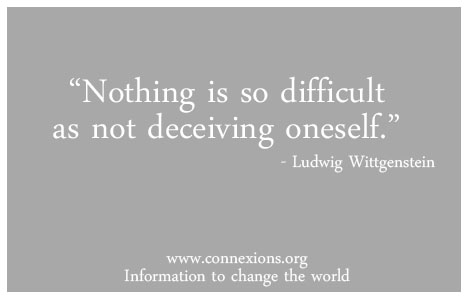
Your support is needed to keep Connexions going
All of the work of the Connexions project is done by volunteers, but our expenses include rent, phone and computer costs and technical support, as well as expenses related to our ongoing project of converting printed archival materials into digital formats. You can make a one time or regular monthly contribution through the donate page on the Connexions website.
Bequests
Many of us have made working for social justice a lifetime commitment. If you are thinking about leaving a legacy for social justice that will live on, you might want to consider leaving a bequest to Connexions in your will. If you'd like to discuss this option, please contact us or see the Bequest page.



